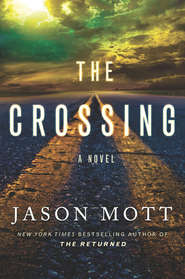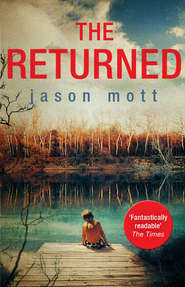По всем вопросам обращайтесь на: info@litportal.ru
(©) 2003-2024.
✖
Ava's Gift
Автор
Год написания книги
2019
Настройки чтения
Размер шрифта
Высота строк
Поля
Yet he could not deny the way that being with the father who had been gone for so long made him remember the family they once were. He remembered the small things: the lavender scent of his mother’s hair, the roughness of his father’s hands as the man lifted him into the air and spun him the way fathers sometimes did. He remembered the sugared strawberries his mother used to make. He remembered the way his father argued with sports announcers while watching football games. And he remembered how it all ended.
They were in the car together, rumbling over the highway with Tom behind the wheel. He was a construct of muscles and brown hair staring out through the windshield and chatting, now again, with Wash’s mother about what she picked out for dinner. Wash was buckled into the backseat, barely tall enough to look out of the window. He lolled back in the seat and watched the clouds as they passed in their predictable patterns, punctuated now and then by the upper quarters of buildings that he remembered from previous shopping trips. His mother turned on the radio and sang along with it and he sang along when he could. There was the sound of their voices mingled with the music and the sound of cars passing from time to time as the blue sky swept along silently, stretching out over the entirety of the world.
And then there was a squeal of the tires and Tom cursed and the sky turned at an awkward angle. The angle steepened until the boy could understand that the car was rolling, over and over. The car trembled and Wash was thrown back and forth in his seat belt and he was frightened. And then, as quickly as it started, everything came to a silent stop. The car was on its side and Wash was crying and calling for his mother. She hung from her seat belt at an awkward angle with her arms swinging limply like pendulums back and forth above the earth.
“Mama! Mama!” Wash called.
“Stay still, Wash,” Tom said. He was on the side of the car that was on the ground and he wrestled with his seat belt until it unfastened. Wash cried and rubbed his eyes and grappled with his own seat belt. “Just stay where you are for a second, son,” Tom continued. There was a tremble in his voice, a wince of pain. It was then that Wash saw the blood.
The glass of the car window had broken and there was a large open wound stretching across the side of his father’s face. Tom reached up with one hand and touched it and grimaced and the blood was beginning to flow. Wash had never seen his father bleed. It felt like a broken promise.
Wash’s mother still hung limply in her seat belt. Tom put his arms around her unconscious body and carefully cradled her neck and, after some effort, released the seat belt. She fell like a marionette doll into his arms. He collapsed beneath the weight of her, barely able to stand. Wash cried harder. “It’s okay, son,” Tom said. “I’m coming to get you. Let me just get Mommy squared away.” He placed her gently at his feet—he was standing on the passenger’s side door, still getting his bearings in the sideways car. Then he maneuvered his way back over the front seat and unbuckled the boy’s seat belt and caught him when he fell. “We’re going to be okay,” he said.
But everything was not okay. It was not until she was completely out of the car that Wash and Tom saw the wound on the side of her head. The medical examiner would eventually tell them that she had hit her head against the frame of the car as the car rolled down the side of the mountain. Death was instantaneous.
Nothing much worked for Tom after that. He took to drinking and lying in bed for the whole of the day. In the late hours of the night Wash would waken and hear his father crying behind the closed door of his bedroom. When he knocked on the door and asked his father what was wrong, the man did not answer. He did not yell for the child to go back to bed. He did not try to hide his tears. He only continued wailing and calling his wife’s name while his son sat on the other side of the door, small and powerless.
Wash began spending the weekends at his grandmother’s after that. And then the weekends spilled over into weekdays until, finally, Tom arrived one day and sat on the couch beside his son and said, in a flat and hollow tone, “I’m leaving for a little while.” The gash Tom sustained during the car crash had healed over, leaving the scar that would remain for the rest of his days. It was long and garish and impossible to ignore, like the emptiness death leaves in its wake.
That was nearly six years ago. Now Wash was alone in the mountains with a man that looked very much like the father he used to know, but who was not that man. And neither was Wash the boy he once was. They were both strangers living in the bodies of people who used to love each other.
* * *
“Five more minutes,” Carmen called through the house.
“I heard you five minutes ago,” Ava replied.
The two of them were on opposite ends of the house—Carmen in her bathroom, using it for the third time in the past fifteen minutes. Meanwhile Ava was on the other end of the house in the other bathroom, wrestling with her hair so that the two of them could leave for Dr. Arnold’s.
Вы ознакомились с фрагментом книги.
Приобретайте полный текст книги у нашего партнера:
Приобретайте полный текст книги у нашего партнера:







